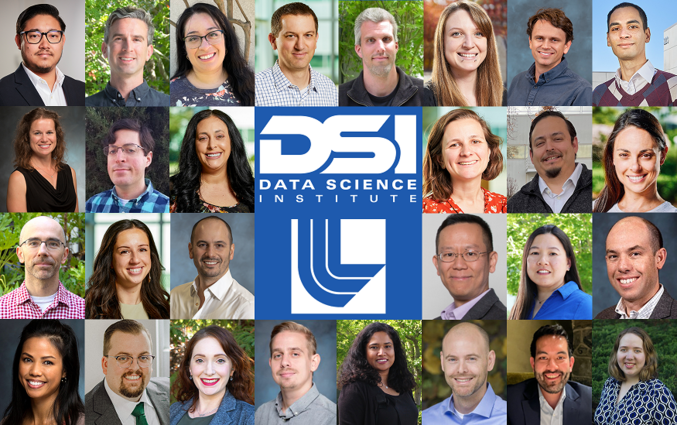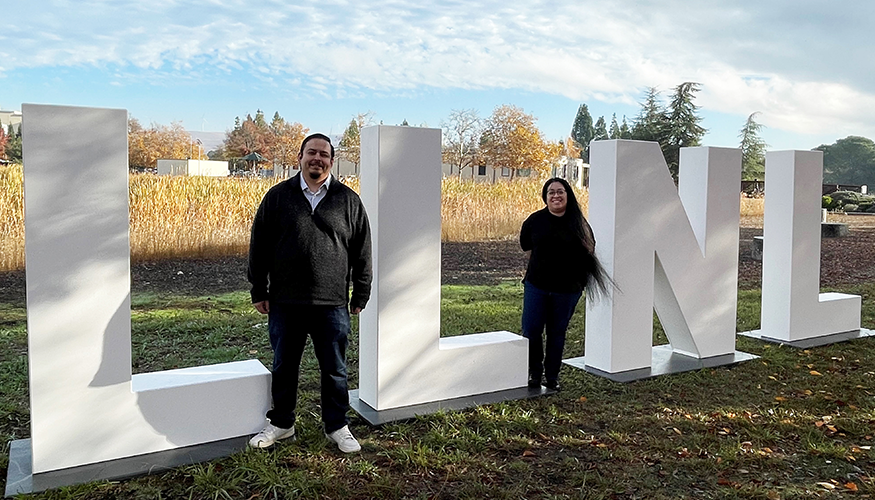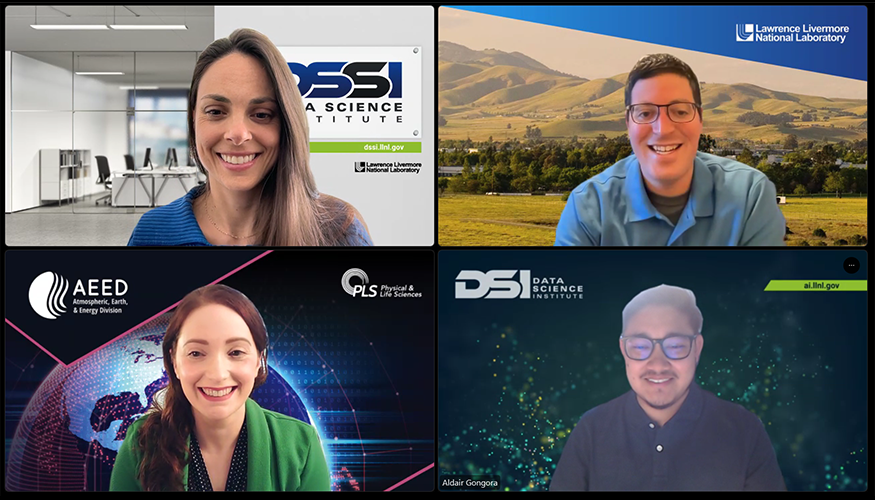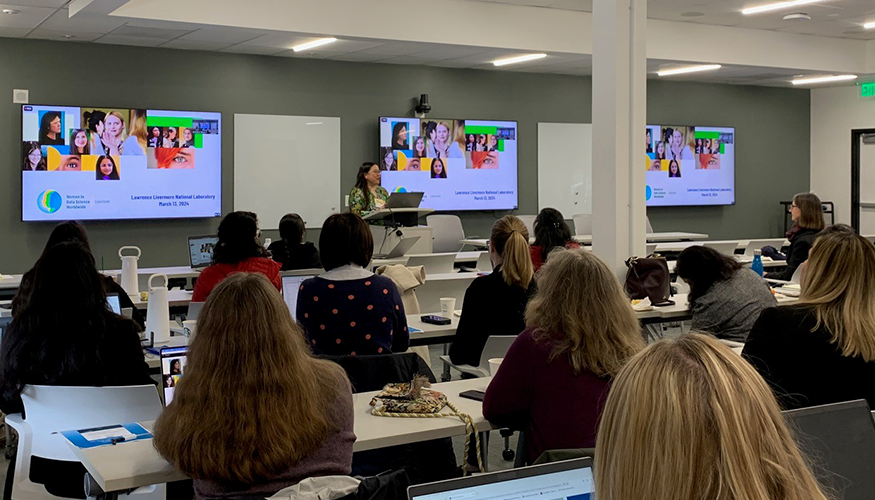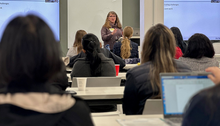Welcome new DSI team members
When Data Science Institute (DSI) director Brian Giera and deputy director Cindy Gonzales began planning activities for fiscal year 2024 and beyond, they immediately realized that LLNL’s growth in data science and artificial intelligence (AI)/machine learning (ML) research requires corresponding growth in the DSI’s efforts. “Our field is booming,” Giera states. “The Lab has a stake in the larger AI/ML community, especially when it comes to national security, and is investing accordingly in research and supporting programs. The future is wide open.”
For the DSI, a brighter spotlight on data science and AI/ML translates into staff opportunities. Gonzales points out, “The demand signal is clear: We need more opportunities for staff to engage, contribute ideas, and ultimately strengthen the DSI as the field continues to flourish. It has been awesome to see interest from all career levels who are eager to bring new ideas to streamline, maintain, and even grow the DSI like never before.”
Over the past few months, the DSI Council reviewed applications and invited the following staff to join the DSI team. “We’ve made an investment in our organization, expanding existing focus areas as well as creating new roles,” says Giera.
Student Synergy
The DSI’s two student programs—Data Science Summer Institute (DSSI) and Data Science Challenge (DSC)—have enjoyed many years of success. Under a new banner of Data Science Student Internships, an expanded leadership team will help the programs scale and more closely coordinate with each other, while also providing students and mentors with the flexibility of year-round opportunities.
Brian Gallagher, who has led the DSC since 2021, will oversee the combined programs with assistance from Omar DeGuchy, Amanda Muyskens, Kerianne Pruett, and Mary Silva—all of whom bring mentoring experience and data science expertise to the team. In addition, workforce administrator Kendall Luna joins DSI administrator Sira Neily in managing student applications, onboarding, office space, and more.
Gallagher states, “I’m really excited about working with this leadership team. We are all passionate about growing these programs, and this new organization allows us to devote more attention to developing challenge problems, evaluating the huge number of applications we receive, and opening more pathways to employment at LLNL. As always, providing students with the best possible experience remains a priority.”
DeGuchy takes over from Gallagher as DSC lead. He is a data scientist in the Global Security Z Program with expertise in the development and application of deep learning models for object detection across a variety of modalities. DeGuchy enjoys recruiting at his alma mater —University of California (UC), Merced—as well as mentoring students and new hires. He says, “I look forward to continuing the DSC’s impact on students and the Lab, and hope to expand the opportunity to other institutions.” In addition to welcoming UC Merced and Riverside students, the DSC adds a Case Western Reserve University cohort this year.
Muyskens, most recently DSSI co-director, has transitioned to Summer Internships Lead. She is a statistician in the Computational Engineering Division with research focused on Gaussian processes, computationally efficient statistical methods, and uncertainty quantification. Her team’s innovative and computationally efficient Gaussian Process hyperparameter estimation method for large data, called MuyGPs, has been applied to space-based image classification. “Our DSSI summer students are so consistently phenomenal that it is such a joy to share in their ideas and enthusiasm for our work. The program is a true beacon for the advancement of data science, and I am excited to explore new areas of data science with them,” Muyskens notes.
Pruett serves as Challenge Problem Development Lead, a new role for the student programs. Building off her DSC and DSSI mentoring experience, she will prepare datasets, code, and instructional materials to guide interns through a real-world challenge problem relevant to LLNL’s missions. She states, “I am truly honored to take on this new role as it means that I will have a continuous opportunity to keep doing one of my biggest passions: mentoring students! Not only will I continue technically mentoring students, but I now get a chance to shape and structure materials that can actually make a difference in these students lives and careers.”
Silva assumes another new role: Student Outreach Lead. A two-time DSSI intern, she now contributes to the Lab’s Generative Unconstrained Intelligent Drug Engineering (GUIDE) program and the multi-institutional the Scalable Precision Medicine Open Knowledge Engine (SPOKE) project. Silva’s outreach experience includes organization of LLNL’s Women in Data Science (WiDS) conference and datathon challenge. “I’m committed to providing students with not only technical guidance but also encouragement to navigate challenges. Having received support from DSI leaders at the beginning of my career, this is my chance to give back,” she says.
Consultant Cadre
Another area expanding under the DSI’s purview is the Consulting Service (DSICS), which is available to LLNL researchers, experimenters, principal investigators, project leaders, and program managers. Consultants are experts in AI/ML, deep learning, reinforcement learning, predictive modeling, experimental design, and statistical inference. Led by statistician Jason Bernstein, the DSICS welcomes three new deputy directors: Gemma Anderson, Giselle Fernandez, and Aldair Gongora.
A research physicist in the Climate Sensitivity and Impacts group, Anderson has used machine learning and uncertainty quantification to improve predictive capabilities and physics understanding for a range of scientific problems in climate, inertial confinement fusion, and seismology. In addition to her research, Anderson is passionate about mentoring of, and outreach to, postdoctoral researchers and students both at the Lab and in Bay Area programs. She states, “I find it incredibly rewarding to help people and solve problems, so I’m really looking forward to engaging with more people across the Lab and helping them with their data science questions through DSICS.”
Fernandez is a data scientist specializing in machine learning, sensitivity analysis, and uncertainty quantification in the Atmospheric Science Research and Applications group. Her work spans inertial fusion energy; materials science; and the assessment of atmospheric flow, transport, and hazards. “Data science opens realms of possibility, turning challenges into cross-disciplinary innovations. That's the part I love most,” Fernandez remarks. Beyond her technical contributions, she is committed to mentorship, drawing inspiration from her mother's teaching career, and adds, “Inspiring young minds is as rewarding as scientific discovery.”
Gongora is a staff scientist in the Analytics for Advanced Manufacturing group where he supports the Advanced Manufacturing Lab and the Center for Engineered Materials and Manufacturing. Among his projects is an effort to accelerate scientific research in the experimental sciences via “self-driving” labs. “The consulting experience has been very fulfilling so far as it provides insight into a wide range of projects at the Lab. I’m looking forward to helping increase accessibility to and utilization of data science tools and machine learning approaches in all facets of the scientific process,” says Gongora, who also mentors DSSI students.
Bernstein is pleased to add the deputies’ depth of expertise to the DSICS’s bench. “Gemma, Giselle, and Aldair bring unique experiences and strengths to the DSI Consulting Service. Their perspectives and enthusiasm will greatly expand the reach of DSICS and benefit consultants and consultees alike!” he notes.
Accomplished Ambassadors
DSI ambassadors play a valuable role in the Lab’s data science community, making connections both internally and externally. “As our field sees increasing investments and visibility, we need to draw on a diversity of experiences and backgrounds to bring new perspectives needed to envision the future,” Gonzales points out.
Felipe Leno da Silva, who joined the Lab in 2021 as a reinforcement learning researcher, is the new seminar series and workshop coordinator. He is a guest editor for Neural Computing and Applications and has organized several workshop series, including the Adaptive and Learning Agents workshop during 2020–2022 and the Latinx in AI workshop at NeurIPS. “I am excited to bring my perspective to the table and help promote new conversations with academic and industry partners,” says Leno da Silva, whose research interests include transfer learning, multiagent systems, power electronics, smart grid, transportation, antibody development, and AI-assisted healthcare.
Andrew Gillette joins the ambassadors with a focus on staff training, serving as director of a new program called SEAM (Shared Education in Artificial intelligence and Machine learning). SEAM offers courses for LLNL staff who want to learn more about AI/ML tools. Gillette is a computational mathematician who incorporates machine learning, cognitive simulation, and other data science techniques into applied math problems. Before joining LLNL in 2019, he was a tenured professor at the University of Arizona. “SEAM serves not only as an in-house professional development course for current staff but also as a means to expand communities at the Lab with mission-relevant AI/ML expertise,” he says.
Josh Ottaway fills the new role of Strategic Deterrence (SD) ambassador, which will deepen the connection between the DSI and LLNL’s stockpile stewardship mission. As the programmatic lead for LLNL’s Stockpile Systems Surveillance group, he has worked on data science–related projects for aging and lifetimes, surveillance, life extension, and modernization, including developing a gas analysis chemometrics tool for advanced data analysis of gas chromatography/mass spectrometry data and application of data fusion approaches on stockpile surveillance data. “I’m excited to start bringing the interesting and complicated questions within SD to the wider data science community here at LLNL and finding novel ways that data science will allow us to answer those questions faster and more thoroughly,” states Ottaway.
In addition to her role with student internships (see above), Pruett manages the Open Data Initiative (ODI) as part of a new Open Data Science effort, which focuses on an accessible ecosystem of data, code, and compute resources. Her research focuses on applying data science and machine learning to a breadth of science and national security topics, such as optical astronomy, space domain awareness, conflict simulation, and engagement modeling.
Marisa Torres has long been the Lab’s ambassador to the global WiDS Worldwide organization, and because of her internal and external outreach efforts, LLNL is a seven-time host of the WiDS Livermore regional conference. She is a bioinformatics lead and the first staff member to be featured on this website. She works on a range of Global Security projects, contributes to the Accelerating Therapeutics for Opportunities in Medicine (ATOM) consortium, and guides students in the Girls Who Code program. “It’s important to continue to build the women in data science and girls in STEM communities, so we can provide sustained support and inspiration through career explorations and journeys,” notes Torres.
Rounding out the ambassador team, Brian Weston brings a focus on cloud computing to the data science community, championing the integration of cloud resources with digital engineering transformation. A research scientist in the Center for Applied Scientific Computing, Weston is the AI/ML lead for the Digital Twins for Additive Manufacturing project as well as a program liaison between scientists and LLNL’s cloud infrastructure team. He explains, “A lot of powerful AI and software services exist in the public realm that we can leverage to augment our complex workflows and simulations. By integrating these cloud-based resources into the complex, we can unlock new capabilities and add significant value to our research and development efforts.”
Council Collaboration
Finally, the DSI Council welcomes two new members to serve alongside Timo Bremer, Barry Chen, Goran Konjevod, Dan Merl, and Michael Schneider. Ryan Goldhahn joined the Lab in 2015 and works in the Signal and Imagery Systems group. His research focuses on networked autonomous systems, including algorithms for decentralized detection/estimation and cooperative behaviors for multi-agent systems. Goldhahn leads multiple projects in emerging technical areas such as collaborative autonomy and adversarial AI. He states, “I’m excited for the opportunity to work with such a distinguished group to apply data science to the Laboratory’s missions.”
Nisha Mulakken, who co-directed the DSSI for three years, leads the Bioinformatics group in LLNL’s Global Security Computing Applications Division. A four-time summer intern and long-time employee, she works on a range of projects including the Integrated Biothreat Assessment Platform, the Invisible Organ “Gut Microbiome on a Chip” project, and the Purposing Raw Intake for ML-Enabled Detection project. “DSSI co-director was a deeply rewarding role where I connected students with LLNL projects and introduced them to staff through Mentor Spotlight career interviews. I look forward to taking the lessons I learned to further develop data science student programs,” Mulakken says.
According to Giera, the DSI’s strong organizational foundation has paved the way for these new opportunities in student development, project consulting, ambassadorships, and DSI leadership. “I’m amazed at the breadth of experience and technical knowledge we’ve managed to assemble but, at the same time, not at all surprised to find incredible data science experts at the Lab,” he says. “Together we’re already doing great things, and we’re ready to seize the opportunities data science will bring to the NNSA.”

